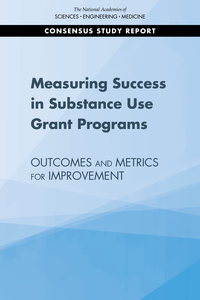Measuring Success in Substance Use Grant Programs Outcomes and Metrics for Improvement

As the opioid epidemic continues to cause suffering for millions of Americans, the United States government is responding in many different ways. In 2016, lawmakers passed the Comprehensive Addiction and Recovery Act, which included several grant programs to help reduce opioid-related harm and promote recovery from substance use disorder. As part of this law, the National Academies of Sciences, Engineering, and Medicine was asked to issue a series of studies evaluating the success of these grant programs, which are funded and administered by the Substance Abuse and Mental Health Services Administration.
The opioid epidemic, now several decades in the making, continues to cause pain and suffering for millions of Americans. Each year, thousands of individuals die from overdose, and thousands more grieve from these losses. Opioid use disorder (OUD) can lead to a complete interruption of day-to-day activities, including caring for one’s family, maintaining a job or career, or keeping track of basic necessities, such as health care and finances.
This report, the first in a series of three, examines four of the Substance Abuse and Mental Health Services Administration (SAMHSA)’s grant programs that help alleviate suffering due to opioids and improve treatment quality and access. It offers recommendations about the existing reporting tools used by these programs and and proposes additional metrics and outcomes that should be considered.
- ISSUP members can join Networks to comment – Sign in or become a member